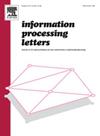On the complexity of some restricted variants of Quotient Pigeon and a weak variant of Kőnig
IF 0.6
4区 计算机科学
Q4 COMPUTER SCIENCE, INFORMATION SYSTEMS
引用次数: 0
Abstract
One of the most famous TFNP subclasses is PPP, which is the set of all search problems whose totality is guaranteed by the pigeonhole principle. The author's recent preprint [1] has introduced a TFNP problem related to the pigeonhole principle over a quotient set, called Quotient Pigeon, and shown that the problem Quotient Pigeon is not only PPP-hard but also PLS-hard. In this paper, we formulate other computational problems related to the pigeonhole principle over a quotient set via an explicit representation of the equivalence classes. Our new formulation introduces a non-trivial -complete problem for every . Furthermore, we consider the computational complexity of a computational problem related to Kőnig's lemma, which is a weaker variant of the problem formulated by Pasarkar et al. [2]. We show that our weaker variant is PPAD-hard and is in .
商鸽的一些限制变体和Kőnig的一个弱变体的复杂性
最著名的TFNP子类之一是PPP,它是所有搜索问题的集合,其总体是由鸽子洞原理保证的。作者最近的预印本[1]介绍了一个与鸽子洞原理相关的商集上的TFNP问题,称为商鸽,并证明了商鸽问题不仅是ppp困难的,而且是pls困难的。本文通过等价类的显式表示,给出了与商集上鸽子洞原理相关的其他计算问题。我们的新公式对每k≥2引入了一个非平凡PPP∩ppak完全问题。此外,我们考虑与Kőnig引理相关的计算问题的计算复杂性,该引理是Pasarkar等人提出的问题的较弱变体。我们的弱变体是PPAD-hard,位于PPP∩PPA。
本文章由计算机程序翻译,如有差异,请以英文原文为准。
求助全文
约1分钟内获得全文
求助全文
来源期刊

Information Processing Letters
工程技术-计算机:信息系统
CiteScore
1.80
自引率
0.00%
发文量
70
审稿时长
7.3 months
期刊介绍:
Information Processing Letters invites submission of original research articles that focus on fundamental aspects of information processing and computing. This naturally includes work in the broadly understood field of theoretical computer science; although papers in all areas of scientific inquiry will be given consideration, provided that they describe research contributions credibly motivated by applications to computing and involve rigorous methodology. High quality experimental papers that address topics of sufficiently broad interest may also be considered.
Since its inception in 1971, Information Processing Letters has served as a forum for timely dissemination of short, concise and focused research contributions. Continuing with this tradition, and to expedite the reviewing process, manuscripts are generally limited in length to nine pages when they appear in print.
 求助内容:
求助内容: 应助结果提醒方式:
应助结果提醒方式:


